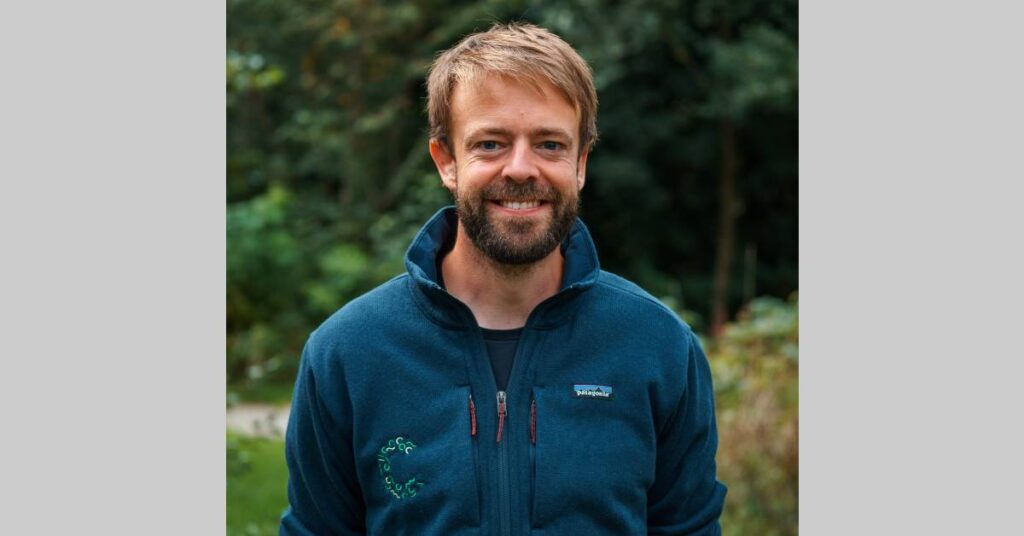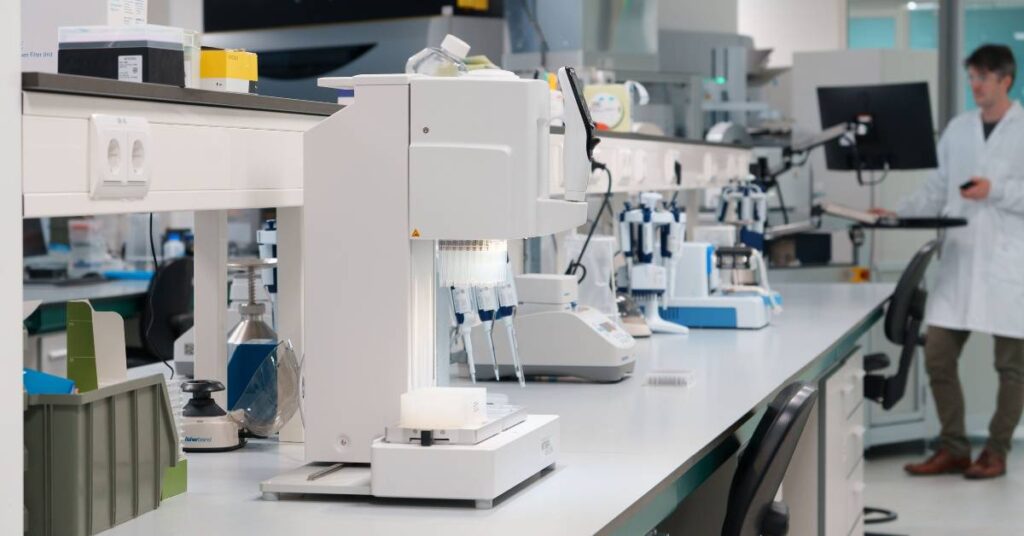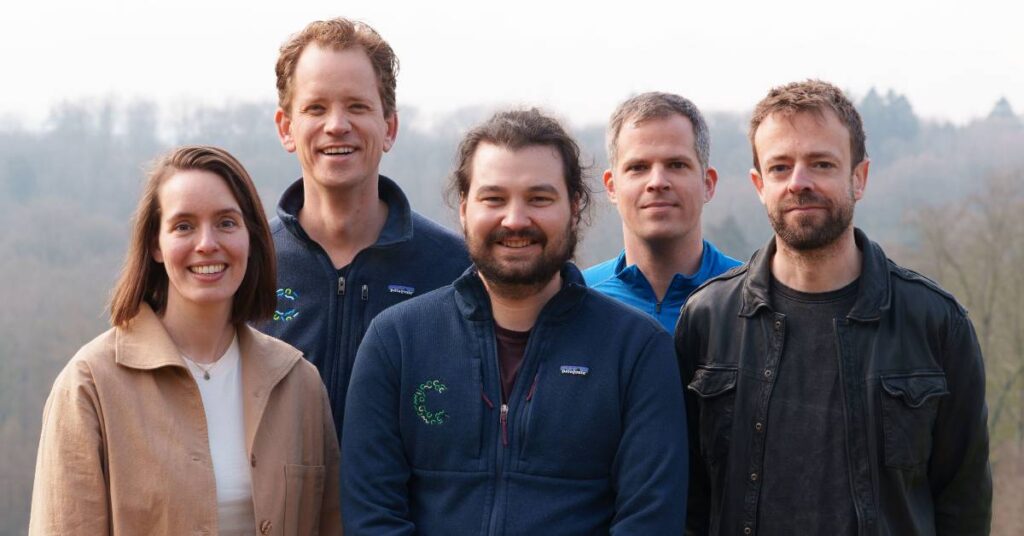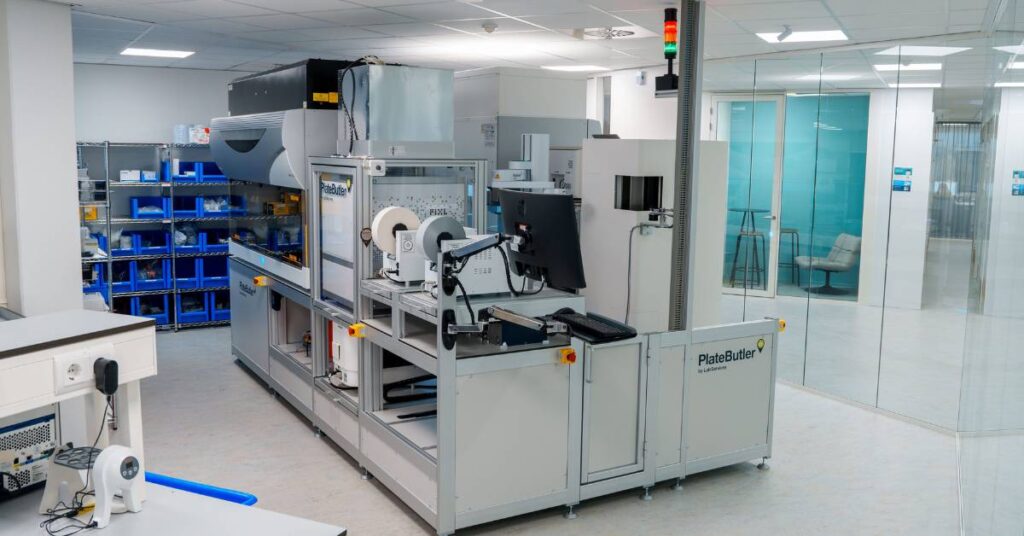In a bustling biotech lab in Amsterdam, a quiet revolution is taking place. Cradle, the AI-powered protein engineering company, is solving some of biology’s most complex challenges by assembling one of Europe’s most diverse technical teams. With 70 employees spanning more than 10 nationalities across Amsterdam and Zurich, the company exemplifies how strategic international hiring can accelerate innovation in cutting-edge fields.
Founded in 2021 by former Uber executive Jelle Prins and ex-Google X researcher Steph van Grieken with Elise de Reus, Eli Bixby, and Harmen van Rossum, Cradle has raised over $100M to develop AI models. These models can design proteins 10 to 12 times faster than traditional methods. But perhaps more impressive than their technology is how they’ve built a team capable of tackling such ambitious goals.
“We truly believe that AI is going to help cure a bunch of diseases, help tackle problems like climate change and pollution,” says Prins, reflecting on what attracts top talent to join their mission. “There are few places where you can do that kind of meaningful work, and Cradle is one of them.”
The Global Talent Hunt

Cradle’s international hiring strategy wasn’t born from choice alone, Prins calls it a necessity. The company operates in the intersection of artificial intelligence and biology, two fields requiring highly specialised expertise that simply isn’t available in sufficient quantities in any single country.
“Most of the AI talent we are hiring is in Zurich,” explains Prins. “The reason there is a lot of that type of talent in Zurich is because Google has a huge office with AI research there, which in turn has also attracted companies like Nvidia, Anthropic, OpenAI, Apple, Meta and so on.”
This talent clustering effect has shaped Cradle’s dual-location strategy, with their AI research team primarily based in Zurich while their biology lab operations remain in Amsterdam. The arrangement allows them to tap into Switzerland’s concentrated AI expertise while maintaining their Dutch roots and laboratory facilities.
The company’s lab team in Amsterdam tells a different story of international diversity. Scientists from Canada, the United States, and India work alongside Dutch researchers to validate AI models and generate the experimental data that trains Cradle’s algorithms. Among them is Jack, an automation engineer responsible for programming the robots that speed up manual laboratory processes, which Prins terms a crucial role in scaling their protein testing capabilities.
Beyond the Obvious: What Makes Top AI Talent
When recruiting internationally, Cradle looks beyond traditional credentials. According to Prins, the best candidates share several key attributes that transcend nationality or educational background.
“What we found is that they come from diverse backgrounds with diverse interests,” he explains. “They are often AI researchers building the fundamental block of AI and they very deeply understand what makes them work and have practical experience training them.”
Perhaps more importantly, Cradle seeks AI researchers willing to handle unglamorous but essential work. “The best talent is excellent at getting their hands dirty with data pipelines, infrastructure, experiment design, cleaning up data,” Prins notes. “They don’t shy away from the nitty-gritty of data cleaning and system engineering.”
This philosophy has helped them attract researchers and engineers who might otherwise gravitate toward pure tech roles at big tech giants. Using the Highly Skilled Migrant Visa, Cradle has recruited diverse international talent across its engineering and laboratory operations in Amsterdam. On the engineering side, the startup has hired specialists in highly specific areas like protein visualisation software development, while on the laboratory side, it has brought in professionals who design, automate, and execute our experimental processes.

One notable hire is the aforementioned Jack, a lab automation engineer, who exemplifies the type of exceptional international talent Cradle has attracted to Amsterdam. “Jack works closely with our laboratory team to automate complex processes, ensuring our various instruments and systems can communicate effectively with each other,” says Prins, adding, “What sets him apart is his deep curiosity about understanding why our lab team follows specific protocols and procedures.”
Cradle operates its own wet lab in Amsterdam to validate AI models before deploying them to customers. For the lab team at Cradle, this approach allows for a provision to automate lab processes and ensure that the specific insights and knowledge embedded in manual procedures aren’t lost in translation.
“The international expertise in our lab has been crucial as we’ve learned that laboratory design needs to evolve for the AI era,” adds Prins.
The work of Jack and others at their Amsterdam lab has helped Cradle to generate smaller datasets in a shorter period than large datasets infrequently. This process allows them to continuously improve their AI models and openly share these learnings through their published research to help other companies design laboratories suitable for AI-driven protein engineering. The automation expertise of Jack enables this rapid iteration cycle that’s fundamental to Cradle’s approach.
Navigating the Visa Landscape

While Cradle has successfully utilised Netherlands’ Highly Skilled Migrant Visa program to bring international talent to Amsterdam, Prins says the process had low difficulty once they were “approved as a company who can sponsor visas.”
He adds, “So far the application process is quite straightforward and occasionally, we seek help from an external party for guidance.”
As a startup operating at the intersection of AI, biotechnology, and software engineering, Cradle requires exceptionally diverse talents ranging from AI researchers and machine learning specialists to microbiologists and protein engineers. “Many positions on our team require PhD-level expertise, as we compete at the highest level in protein design and need to attract the most talented professionals globally,” explains Prins.
The Netherlands doesn’t have a sufficient pool of candidates with these highly specialised qualifications. However, government programs like the Highly Skilled Migrant Visa help with their hiring strategy, allowing startups like Cradle to confidently extend offers to the world’s top talent for their Amsterdam office.
He adds, “These programs remove the uncertainty and bureaucratic barriers that could otherwise prevent exceptional candidates from joining our team, enabling us to build the multidisciplinary expertise required for our AI-powered protein engineering platform.”
Building an AI Ecosystem
Cradle’s hiring strategy reflects broader ambitions for the Netherlands’ AI ecosystem. Prins advocates for creating an AI hub in Amsterdam, leveraging the fact that 40 per cent of the country’s AI talent is already concentrated there while another 80 per cent is in Randstad.
“Top talent wants to work close to other top talent,” he explains. “An AI hub would allow us to have 365 meetups per year, a meetup every day organised in the building.”
This clustering approach has proven successful in other tech hubs. Just as Zurich’s concentration of AI companies makes it more attractive to researchers, Amsterdam could benefit from similar network effects. Prins even proposes that healthy competition and “poaching” between companies strengthens the overall ecosystem by giving talent more options and career mobility.
To reach its goal of helping scientific teams engineer proteins faster, Cradle aims to grow its team to 100 employees and international talent will play a crucial role. The company plans to expand across multiple functions: a new mammalian cell laboratory requiring specialised biologists, additional AI researchers, platform engineers, and customer success teams.

The diversity of these roles means different hiring strategies for different locations. While AI research talent will likely continue concentrating in Zurich, Amsterdam will see growth in biology, engineering, and business functions. The challenge lies in maintaining team cohesion across locations while accessing the best talent globally.
“We expand the team as we are signing more customers,” Prins explains. “But naturally, our ambition is to grow, sometime in the next year we would hit 100.”
A Mission That Transcends Borders
Perhaps Cradle’s greatest advantage in international hiring isn’t their compensation packages or visa assistance – it’s their mission. In an AI landscape dominated by chatbots and consumer applications, Cradle offers something different: the chance to apply cutting-edge technology to humanity’s most pressing challenges.
“Obviously, you can do very interesting stuff at OpenAI or Anthropic or Google or Meta, but their products are basically the same,” Prins observes. “If you want to apply your skills to a different type of mission, there are few places where you can do that.”
This mission-driven approach to talent acquisition may turn out to be Cradle’s most sustainable competitive advantage. As the company continues scaling its ambitious goals of transforming protein engineering, their international team serves not just as a workforce, but as proof that meaningful innovation transcends geographical boundaries.
“It’s absolutely key for us,” quips Prins, before adding, “If this wasn’t possible, we wouldn’t be able to build such a strong team and removing any hurdles is vital for startups like us to thrive.”
For the Netherlands’ broader tech ecosystem, Cradle’s success in attracting and retaining international talent offers a blueprint for competing in the global AI race, not just through policy and infrastructure, but through the power of purpose-driven innovation.










